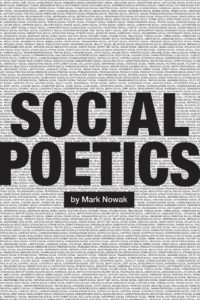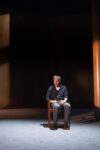
[Coffee House Press; 2020]
Inquiries into the use-value of poetry rarely glean more than frustrated cynicism or, worse, heartfelt re-avowals of Auden’s “poetry makes nothing happen” ( . . . but we love and need it anyway, etc.). Mark Nowak’s Social Poetics draws interest, because it approaches the quandary as a gesture towards revolutionary solidarity, rather than literary prestige, and focuses on the material role poetry can play in workers’ movements. The book is a document of Nowak’s exploration of poetry’s liberatory potential, delving into his lifetime of organizing and his theories of “social poetics,” but is most effectively conceived as a diary of praxis. Nowak describes it as, “not an academic monograph, not an autobiography, not a detailed account of my thirty-year history teaching poetry workshops in the community, in prisons, in schools, and in worker centers and trade union halls — though it is, in part, all these things, too.”
In theorizing a notion of social poetics, Nowak chronicles his time with the Working Writers School (WWS), a workshop program he founded in New York City, and the poetry workshops he’s led with workers all over the world. The book is firmly grounded in a history that Nowak sketches of others who practiced social poetics, like Amiri Baraka, Adrienne Rich, and Ngũgĩ wa Thiong’o. But he doesn’t restrict his influences to the icons of political poetry. He rescues from the archive essential anthologies of working-class poets and contextualizes his work by pointing to movements of workers’ poetry that have occurred throughout the world. He also makes noted use of various theorists’ prison writings, including Ngũgĩ’s, Liao Yiwu’s, and Antonio Gramsci’s, further intimating that the goals of his work rest outside of the literary canon and more in the realm of socialist political practice.
Social poetics render the poet’s social role. They confront the work of the poet as a vocation within society, in order to articulate “a new conjunction of aesthetic practice and political action.” A primary mode of social intervention for Nowak rests in reclaiming “the workshop” from an exclusionary academy and returning it to something that more properly enacts that word’s etymology, that is, a space wherein workers perform a craft. Throughout Social Poetics, Nowak documents his experiences leading workshops with workers, holding pop-up readings, and assisting in union organizing.
A powerful moment of poetry-as-praxis comes when a workshop Nowak planned to lead at a Ford plant in Port Elizabeth, South Africa got shut down by the HR department. Poetry stood as a formidable, and subsequently suppressed, opponent to management: “They don’t want us talking to each other. They don’t want workers talking.” Nowak’s workshop included videos of poets, Denny Dickhausen and Joe Callahan, from workshops at Ford plants in Minnesota reading their poems, which document the ways Ford had violated and mistreated them as employees. The Minnesota plants had closed, both Denny and Joe were out of jobs, and similar changes were likely in South Africa. Nowak and members of the plant’s union managed to secure an alternate venue and conduct the workshop despite the interference from higher ups. In the workshop, the workers wrote poems addressing their exploitation and learned of coming layoffs that management had lied to them about. In this way, the poet is someone who facilitates the articulation of dissent.
The book’s arrival to a series of crises helps to cement the case for a central premise of the book: poets must assist in urgent work towards “a new way of being together.” The month this book was published, March 2020 — the month the American government and its infrastructures began taking seriously the threat of coronavirus, the month of titanic declines in the stock market, the month of locust swarms, food shortages, quarantines, and layoffs — felt dreadfully historic. We clearly cannot continue into the abyss late capitalism affords those wealthy enough to avoid disaster, and Nowak’s writing sets a valuable example in using poetry for what might be its highest objectives: solidarity and liberation.
But the book is long, and not every digression yields valiant examples. The truth is, I was disappointed with Social Poetics, more from its predictability than misguidedness, when Nowak revealed his project’s dire antagonist: conceptual poetry. It reads as a petty academic gesture of asserting one style over another, denying the possibility of productive syntheses. We can’t defeat capitalism by hating conceptual poetry. And what good does blacklisting what’s not in vogue do for a new working class literature? Nowak even helps poets to craft a provocative workers’ conceptualism in a WWS workshop, inspired by the work of Lucia della Paolera, but he underplays the stylistic underpinnings of such a gesture. The way Nowak positions Social Poetics in opposition to an exteriorized avant garde feels unnecessary and limiting to the horizons his poetics are helping to reveal.
Furthermore, I wonder if this puritanical anti-style that rejects any relevance of the canon, or the art world, or certain aesthetic histories, might denude the very dreams he hopes to inspire of the dynamic potential that rests in the past’s totality of literary achievements. I don’t dispute Nowak’s workshop pedagogy, which is clearly thought-out and effective, but rather, I wonder about the ramifications of his vision for social poetics and its exclusion of the liberatory frontier of aesthetic innovation. Nowak says, “Some of us have grown weary of this constant gentrification of literature and the practices that, these days, regularly create it.” But the mechanisms of experimental literary composition and actual gentrification and inequality are wildly unrelated. Why not take Dada and Surrealism, the Black Arts Movement and the Harlem Renaissance, New Narrative and Language Poetry, all the numerous heretical strains of vanguard writing, and help disseminate their lessons to anyone who might want to learn from them? Nowak quotes Bifo Berardi’s The Uprising: On Poetry and Finance, which claims, “Our prospect is a paradigmatic shift: a new paradigm that is not centered on productive growth, profit, and accumulation, but on the full unfolding of the power of collective intelligence.” I don’t agree with Nowak’s implication that the paradigm shift Berardi imagines could arrive through a disregard of previous eras’ formal innovations. I think it takes more than forgetfulness to shift a paradigm.
Ultimately, the book serves as an exciting addition to poetry’s grail quest for a first-person plural, a collective enunciation. Nowak’s writing is attuned to the needs of today in what feels like a new horizon taking shape, part of a larger appreciation for the poetics of relationality and experience, that I think can be aided immensely by Nowak’s vision. In addressing the work of Lourdes Galván — a poet from a WWS workshops — Nowak says, “The political imagination of Lourdes’s poem opens a new space for the production of a new working-class literature and the role such a literature might play in social movements and social rebellion.” Her staggering portrait of the evening she arrived at the Utica, NY bus station rings of the starkly industrial, but quaint hill-scaped grandeur of Upstate New York and the generosity and solidarity of a city surviving winter. Another poet, Noani Mukromin, further explores migrant geographies in a poem called, “My Children, My Hometown”: “It is so hard to live far from you and live in a big town that treats me like a slave.” Nowak then juxtaposes Galván’s and Mukromin’s experiences as migrant farm and service workers with the marketing language and imagery of the natural food industry and “buy local” ad campaigns showing idyllic landscapes of a workerless countryside replete with bountiful harvests.
But while Social Poetics lucidly describes a poet’s efforts to ensure that workers’ struggles inscribe themselves onto history towards the goal of liberation, I question the efficacy of totally equating aesthetic practice and political action. Does art so easily ensure the reality it imagines? I think of how during the Northern Renaissance artists like Pieter Brueghel — who may or may not have come from a peasant background — exalted in representations of the workers and the manpower it took to feed a populace. Scythes, hay bales, and farm workers populated the most renowned art of the period. Then, in the 17th century, most fashionable artists stopped painting workers, favoring the pristine emptiness of an idealist’s pastoralism[1]. But unfortunately, neither century is remarkably known for its exemplary labor conditions for peasants. And so, the question of who is painted, who is written of, who isn’t, and who does or doesn’t create is — while crucially important to the art that is created — ultimately, not coexistent with the liberation of any class of persons, globally or locally. It’s important to remember this, for fear we delude ourselves into believing a poem can do our politics for us.
Nowak is aware of this problem, of how a poem only “survives in the valley of its making,” and addresses it with charming honesty. During an intermission in a workshop in Pretoria, South Africa, someone asks him, “What is poetry going to do for me?” Nowak writes, “I made up some bullshit teacher answer, the truth was I didn’t have one yet.” The question uncomfortably reverberates in my head. In the wake of yet another global crisis, we as working people have been reaffirmed of our disposability under capitalism. Poems, especially those in Social Poetics, do so much to process and articulate wounds of this sort. But I don’t think we can rely on poetry to cure us. It is, as Nowak says, not enough to merely, “give voice.” He also says, and with more confidence, that “poetry is a verb.” His book provides powerful witness to the verb of poetry — poetry as a social act, whereby workers reclaim autonomy over their creations.
Joe Rupprecht is from Syracuse, NY. He is the author of “faggy bird poems” (Ghost City Press 2017). His work has been published or is forthcoming in New Delta Review, Spy Kids Review, Epigraph Magazine, SAND, Entropy, and elsewhere. He tweets @heterofobe
[1] Vardi, Liana, “Imagining the Harvest in Early Modern Europe,” Agrarian Studies
This post may contain affiliate links.








